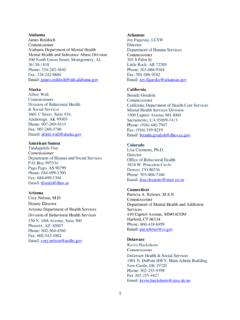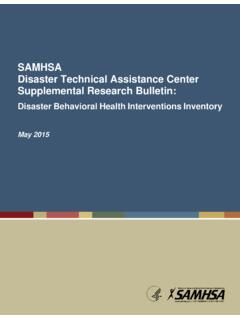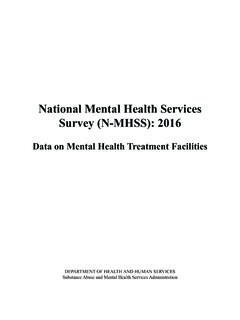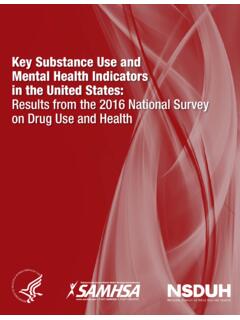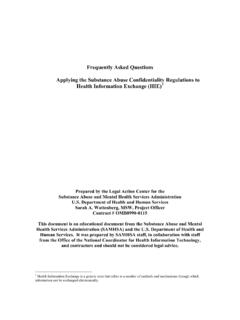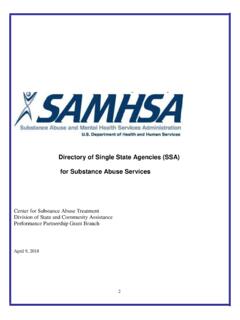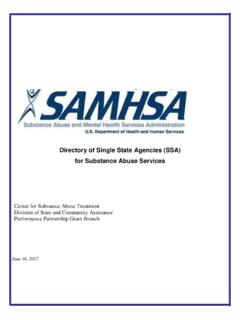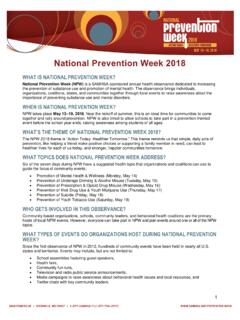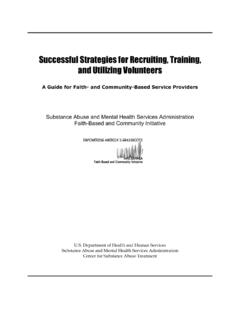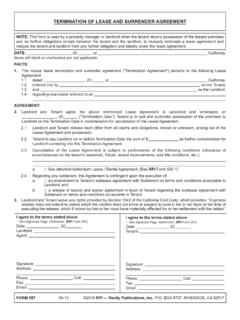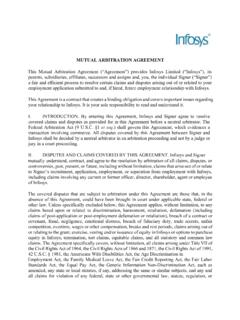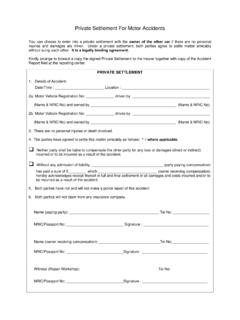Transcription of Core Competencies for Peer Workers in Behavioral Health ...
1 1 BRINGING RECOVERY SUPPORTS TO SCALET echnical Assistance Center Strategy (BRSS TACS)Core Competencies for Peer Workers in Behavioral Health ServicesOVERVIEW In 2015, SAMHSA led an effort to identify the critical knowledge, skills, and abilities (leading to Core Competencies ) needed by anyone who provides peer support services to people with or in recovery from a mental Health or substance use condition. SAMHSA via its Bringing Recovery Supports to Scale Technical Assistance Center Strategy (BRSS TACS) project convened diverse stakeholders from the mental Health consumer and substance use disorder recovery movements to achieve this goal. SAMHSA in conjunction with subject matter experts conducted research to identify Core Competencies for peer Workers in Behavioral Health .
2 SAMHSA later posted the draft Competencies developed with these stakeholders online for comment. This additional input helped refine the Core Competencies and this document represents the final product of that process. As our understanding of peer support grows and the contexts in which peer recovery support services are provided evolve, the Core Competencies must evolve over time. Therefore, updates to these Competencies may occur periodically in the Competencies are intended to apply to all forms of peer support provided to people living with or in recovery from mental Health and/or substance use conditions and delivered by or to adults, young adults, family members and youth.
3 The Competencies may also apply to other forms of peer support provided by other roles known as peer specialists, recovery coaches, parent support providers or youth specialists. These are not a complete set of Competencies for every context in which peer Workers provide services and support. They can serve as the foundation upon which additional Competencies for specific settings that practice peer support and/or for specific groups could be developed in the future. For example, it may be helpful to identify additional Competencies beyond those identified here that may be required to provide peer support services in specific settings such as clinical, school, or correctional settings.
4 Similarly, there may be a need to identify additional Core Competencies needed to provide peer support services to specific groups, such as families, veterans, people in medication-assisted recovery from an SUD, senior citizens, or members of specific ethnic, racial, or gender-orientation What is a peer worker?The role of the peer support worker has been defined as offering and receiving help, based on shared understanding, respect and mutual empowerment between people in similar situations. Peer support has been described as a system of giving and receiving help based on key principles that include shared responsibility, and mutual agreement of what is helpful.
5 1 Peer support Workers engage in a wide range of activities, including advocacy, linkage to resources, sharing of experience, community and relationship building, group facilitation, skill building, mentoring, goal setting, and more. They may also plan and develop groups, services or activities, supervise other peer Workers , provide training, gather information on resources, administer programs or agencies, educate the public and policymakers, and work to raise Mead, S., Hilton, D. & Curtis, L. (2001). Peer support: A theoretical perspective. Psychiatric Rehabilitation Journal, 25(2), Jacobson, N. (2012). What do peer support Workers do? A job description.
6 BMC Health Services Research. 12:2052As mentioned previously, the development of additional Core Competencies may be needed to guide the provision of peer support services to specific groups who also share common experiences such as family members. The shared experience of being in recovery from a mental or substance use disorder or being a family member of a person with a Behavioral Health condition is the foundation on which the peer recovery support relationship is built in the Behavioral Health is recovery?SAMHSA developed the following working definition of recovery by engaging key stakeholders in the mental Health consumer and substance use disorder recovery communities:Recovery is a process of change through which individuals improve their Health and wellness, live self-directed lives, and strive to reach their full the Competencies , the term recovery refers to this definition.
7 This definition does not describe recovery as an end state, but rather as a process. Complete symptom remission is neither a prerequisite of recovery nor a necessary outcome of the process. According the SAMHSA Working Definition of Recovery, recovery can have many pathways that may include professional clinical treatment; use of medications; support from families and in schools; faith-based approaches; peer support; and other approaches. SAMHSA has identified four major dimensions that support a life in recovery: Learning to overcome, manage or more successfully live with the symptoms and makinghealthy choices that support one s physical and emotional wellbeing; A stable and safe place to live; Meaningful daily activities, such as a job, school, volunteer work, or creative endeavors; and,increased ability to lead a self-directed life; and meaningful engagement in society; Relationships and social networks that provide support, friendship, love, and hopePeer Workers help people in all of these are Core Competencies ?
8 Core Competencies are the capacity to easily perform a role or function. They are often described as clusters of the knowledge, skills, and attitudes a person needs to have in order to successfully perform a role or job or as the ability to integrate the necessary knowledge, skills, and attitudes. Training, mentoring, and supervision can help people develop the Competencies needed to perform a role or 5 This will be the first integrated guidance on Competencies for peer Workers with mental Health and substance use lived experience. Why do we need to identify Core Competencies for peer Workers ?Peer Workers and peer recovery support services have become increasingly central to people s efforts to live with or recover from mental Health and substance use disorders.
9 Community-based organizations led by people who have lived experience of mental Health conditions and/or who are in recovery from substance use disorders are playing a growing role in helping people find recovery in the community. Both the mental Health consumer and the substance use disorder recovery communities have recognized the need for Core Competencies and both communities actively participated in the development of these peer recovery support worker Competencies . Potential Uses of Core Competencies Core Competencies have the potential to guide delivery and promote best practices in peer support. They can be used to inform peer training programs, assist in developing standards for certification, and inform job descriptions.
10 Supervisors will be able to use Competencies to appraise peer Workers job performance and peers will be able to assess their own work performance and set goals for continued development of these Competencies . 3 Substance Abuse and Mental Health Services Administration. SAMHSA s Working Definition of Recovery. PEP12-RECDEF, Rockville, MD: Center for Mental Health Services, Substance Abuse and Mental Health Services Administration, Department of Health and Human Services, Henandez, , O Connor, (2010). Strategic Human Resources Management in Health Services Organizations. Third Edition. Delmar Cengage Learning. P. Sperry, L. (2010). Core Competencies in Counseling and Psychotherapy: Becoming a Highly Competent and Effective Therapist.
